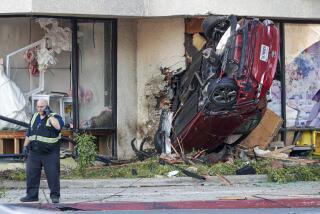Road kill
- Share via
Suppose 245,000 americans had died in terrorist attacks since Sept. 11, 2001. The United States would be beside itself, utterly gripped by a sense of national emergency. Political leaders would speak of nothing else, the United States military would stand at maximum readiness, and the White House would vow not to rest until the danger to Americans had been utterly eradicated.
Yet 245,000 Americans have died because of one specific threat since 9/11, and no one seems to care. While the tragedy of 3,000 lives lost on 9/11 has justified two wars, in which thousands of U.S. soldiers made the ultimate sacrifice, the tragedy of 245,000 lives lost in traffic accidents on the nation’s roads during the same period has justified . . . pretty much no response at all. Terrorism is on the front page day in and day out, but the media rarely even mention road deaths. A few days ago, the National Highway Traffic Safety Administration announced that 42,642 Americans died in traffic in 2006. Did you hear this reported anywhere?
This phenomenon is not just American, it is global. Traffic deaths are the fastest-rising cause of death in the world. Yet you’ve heard far more about H5N1 avian influenza, which has killed 192 people worldwide since being detected five years ago, than about the 6 million people who have died in traffic accidents in the same period. Last year alone, 1.2 million people were killed on the world’s roads, versus about 100,000 dead as a result of combat. The last decade is believed to be the first time in history that roads posed a greater danger to human beings than fighting (which is partly a reflection of the decline of war).
Global prosperity is rising fast, which means that global car ownership is rising fast, and both of those things are good -- but they also mean that global traffic deaths are rising as well. Worldwide, traffic deaths look exactly like a pandemic -- increasing in most nations, with local rapid spikes.
Two forces seem at play in skewed perceptions of these risks. The first is the fundamental difference between harm because of accidents and harm because of deliberate action; the second, society’s strange assumption that traffic fatalities cannot be avoided.
The loss of life caused by terrorism on 9/11 -- or similar losses in other acts of terror or war -- has a wholly different moral standing than loss of life in accidents. Terrorists are criminals whose intent is homicide. Those who act illegally or immorally must be opposed even if that means engaging in complex, expensive, perilous undertakings, as the United States has since the darkness of 9/11. A life lost in a traffic accident is very sad, but it does not involve an offense against morality or human dignity. Most traffic accidents are just that -- accidents. In that sense, it may be reasonable that 3,000 deaths because of terrorism have a disproportionate effect on national policymaking.
Next, cars and trucks possess utility. They are vital to our economy and to our personal freedom. Having millions of cars and trucks roaring every which way is necessary for the American economy to be so productive. Environmental Protection Agency figures show that, in the last three decades, vehicle-miles traveled have risen 170% in the United States. Some of this may be unnecessary, but most vehicle-miles happen because they serve someone’s interest. If the use of cars were restricted, accidents would certainly decline, but so would economic productivity and personal freedom.
Here’s where the big faults in our thinking come into play. Do the media downplay road dangers in part because the auto industry is the No. 1 advertiser on TV and among the top advertisers for newspapers? Detroit would much rather Brian Williams or Katie Couric titter about Paris Hilton, or the L.A. Times feature articles on Waziristan, than hear about 42,642 dead on the roads last year.
Typical Americans are to blame as well. Because we don’t want to contemplate dying in a car crash, we seem to assume that highway fatalities cannot be reduced, that they fall into the “stuff happens” category. This isn’t so. Risks of driving or of crossing the street -- each year more pedestrians die in the United States than the death toll of 9/11 -- could be reduced significantly without any sacrifice of freedom by car owners.
Relative to passenger-miles traveled, traffic fatalities have declined in the United States owing to anti-lock brakes, air bags, impact engineering (a hidden safety feature of most new vehicles) and the big rise in shoulder-harness use (your seat belt is much more important to safety than air bags). Tougher laws and social awareness have reduced drunk driving. Yet fatalities per mile traveled have not fallen as much as might be expected given improved technology and less alcohol-impaired driving. There appear to be two key reasons: cellphones and horsepower.
Driving while yakking may seem harmless to you, but try telling that to the loved ones of the hundreds or even thousands who die each year in totally avoidable phone-related accidents. Holding a cellphone while driving will become illegal in California in 2008. But the odds of getting stopped are slight. Automated cameras now issue speeding tickets; why can’t they issue tickets to owners of cars photographed with a driver using a phone?
Another idea is to pass laws under which, if a driver is on the phone at the moment of a crash, he or she is presumed to be at fault. It is well past time for legislatures to stop waffling on this issue and take action. People make phone calls while driving because they know they can get away with it. This is more important than human life?
The ever-rising horsepower of cars, SUVs and pickup trucks is another reason road fatalities stay high. Twenty years ago, the average new passenger vehicle had 119 horsepower and went from zero to 60 in 13 seconds; this year’s averages are 220 horsepower and zero to 60 in 9.5 seconds. New cars, SUVs and pickup trucks of this model year are the “fastest and most powerful vehicles since the EPA began compiling data,” the federal agency recently said. Even many new family sedans are ridiculously overpowered. Car & Driver magazine recently tested the new, 268-horsepower Toyota Camry: It did zero to 60 in 5.8 seconds, which was Corvette acceleration a generation ago.
Cars with high horsepower and rapid acceleration are easy to lose control of, especially for young drivers. Tap the accelerator in a tight curve for just an instant in that Camry -- to say nothing of socially irresponsible monstrosities such as the 520-horsepower Porsche Cayenne SUV -- and you can lose control. High-horsepower cars enable cutting off and other forms of aggressive driving; cutting off and sudden lane changes are leading causes of highway collisions. A generation ago, a small percentage of American drivers had high-horsepower vehicles. Now the majority do! Is it a coincidence that road rage and high horsepower have occurred simultaneously? High horsepower makes road rage possible, which in turn adds to the death count.
The proliferation of high horsepower cars is doubly wrong because it links to ever-rising petroleum use and greenhouse gases. Automakers have significantly increased powertrain efficiency in the last 20 years -- but the gains have gone into horsepower, not fuel efficiency. Other things being equal, if new-vehicle horsepower were reduced by one-third, miles per gallon would rise by one-third. One decade of sales of new vehicles with one-third higher horsepower accounts for the amount of oil the United States imports from the Persian Gulf region. Reduce horsepower by a third and end U.S. Persian Gulf oil dependence. Yes, it’s that simple. If only we’d actually do it!
Because horsepower is an arms race -- if one automaker offers more, all must -- federal legislation to limit horsepower would offer a good-news trifecta: Higher mpg, reduced greenhouse-gas emissions and lower road fatalities as average motorists stop acting like they’re at a NASCAR track.
Why doesn’t Congress act to end the horsepower wars? Please don’t counter that “no one can tell me what I can drive.” The Constitution says you’ve got a right to own a gun and to read a newspaper. Firearms and materials related to 1st Amendment expression are the only categories of possessions given protected status by the Constitution; courts consistently rule that vehicles on public roads can be regulated for public purposes such as safety.
Horsepower regulation and serious enforcement against cellphone use while driving might save thousands of lives a year. Such reforms might also prevent many billions of dollars in economic losses and make a big dent in the other road-danger figure no one talks about -- 2.6 million Americans injured in traffic crashes last year.
Other reforms, such as pedestrian-activated warning lights at crosswalks, could also reduce traffic deaths in the United States. Numerous reforms could reduce traffic deaths in developing countries. As a nation, we find common ground in agreeing that even one death from terrorism cannot be tolerated. Why are tens of thousands of annual road deaths OK?
--
Lauren Hovel of Barnard College provided research assistance for this article.
More to Read
Sign up for Essential California
The most important California stories and recommendations in your inbox every morning.
You may occasionally receive promotional content from the Los Angeles Times.










